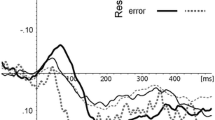Abstract
Subjects high and low in perfectionistic concern over mistakes (CM; Frost, Marten, Lahart, & Rosenblate, 1990) monitored their mistakes daily to test several hypotheses about the nature of mistakes among perfectionists. High-CM subjects did not report a greater number of mistakes, nor were the mistakes reported by high- and low-CM subjects different in quality, based on ratings by independent judges. However, there were differences in personal reactions to mistakes, perceptions of the seriousness of mistakes, beliefs about other peoples' reactions to mistakes, and rumination about mistakes. High-CM subjects reacted more strongly and more negatively to their mistakes. The specific nature of these findings and implications for cognitive-behavioral treatment of perfectionism are discussed.
Similar content being viewed by others
REFERENCES
Beck, A. T. (1976). Cognitive therapy and the emotional disorders. New York: International Universities Press.
Boice, R. (1982). Contingency management in writing and appearance of creative ideas: Implications for the treatment of writing blocks. Behaviour Research and Therapy, 21, 537–543.
Burns, D. D. (1980, November). The perfectionist's script for self-defeat. Psychology Today, pp. 34–51.
Ellis, A. (1962). Reason and emotion in psychotherapy. New York: Lyle Stuart.
Flett, G. L., Hewitt, P. L., Blankstein, K. R., & Koledin, S. (1991). Dimensions of perfectionism and irrational thinking. Journal of Rational-Emotive and Cognitive-Behavior Therapy, 9, 185–201.
Flett, G. L., Hewitt, P. L., Endler, N. S., & Tassone, C. (1994). Perfectionism and components of state and trait anxiety. Current Psychology, 13, 326–350.
Flett, G. L., Russo, F. A., & Hewitt, P. L. (1994). Dimensions of perfectionism and constructive thinking as a coping response. Journal of Rational-Emotive and Cognitive-Behavior Therapy, 12, 163–179.
Frost, R. O., Heimberg, R. G., Holt, C. S., Mattia, J. I., & Neubauer, A. L. (1993). A comparison of two measures of perfectionism. Personality and Individual Differences, 14, 119–126.
Frost, R. O., & Henderson, K. J. (1991). Perfectionism and reactions to athletic competition. Journal of Sport and Exercise Psychology, 13, 323–335.
Frost, R. O., Lahart, C. M., & Rosenblate, R. (1991). The development of perfectionism: A study of daughters and their parents. Cognitive Therapy and Research, 15, 469–489.
Frost, R. O., & Marten, P. A. (1990). Perfectionism and evaluative threat. Cognitive Therapy and Research, 14, 559–572.
Frost, R. O., Marten, P. A., Lahart, C. M., & Rosenblate, R. (1990). The dimensions of perfectionism. Cognitive Therapy and Research, 14, 449–468.
Frost, R. O., Turcotte, T. A., Heimberg, R. G., Mattia, J. I., Holt, C. S., & Hope, D. A. (1995). Reactions to mistakes among subjects high and low in perfectionistic concern over mistakes. Cognitive Therapy and Research, 19, 195–205.
Guidano, V., & Liotti, G. (1983). Cognitive processes and emotional disorders. New York: Guilford Press.
Hewitt, P. L., & Flett, G. L. (1991). Perfectionism in the self and social contexts: Conceptualization, assessment, and association with psychopathology. Journal of Personality and Social Psychology, 60, 456–470.
Hewitt, P. L., Mittelstaedt, W., & Wollert, R. (1989). Validation of a measure of perfectionism. Journal of Personality Assessment, 53, 133–144.
Higgins, E. T. (1987). Self-discrepancy: A theory relating self and affect. Psychological Review, 94, 319–340.
Horney, K. (1950). Neurosis and human growth: The struggle toward self-realization. New York: W. W. Norton.
Juster, H. R., Heimberg, R. G., Frost, R. O., Holt, C. S., Mattia, J. I., & Faccenda, K. (1996). Perfectionism and social phobia. Personality and Individual Differences, 21, 403–410.
Pacht, A. R. (1984). Reflections on perfectionism. American Psychologist, 39, 386–390.
Author information
Authors and Affiliations
Rights and permissions
About this article
Cite this article
Frost, R.O., Trepanier, K.L., Brown, E.J. et al. Self-Monitoring of Mistakes Among Subjects High and Low in Perfectionistic Concern over Mistakes. Cognitive Therapy and Research 21, 209–222 (1997). https://doi.org/10.1023/A:1021884713550
Issue Date:
DOI: https://doi.org/10.1023/A:1021884713550




